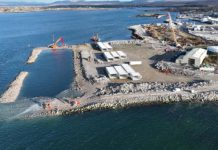After 25 years of service with the Marine Institute the RV Celtic Voyager has set off across the Atlantic to its new owners in Canada.
The Marine Institute’s oldest research vessel departed Ireland, following its purchase by Qikiqtaaluk Corporation of Nunavut, Canada.
The vessel will continue to be used for fisheries research and seabed mapping in Northern Territories and Nunavut in Canada.
Qikiqtaaluk Corporation is the Inuit birthright development corporation for the Qikiqtani Region and seeks to strengthen the social and economic well-being of Nunavut and the 15,000+ Inuit it represents,
Speaking as the vessel departed Irish shores, Michael Gillooly, Interim CEO Marine Institute said “We welcome the purchase of the vessel by Qikiqtaaluk Corporation of Canada, and are pleased to see that it will continue its work in the areas of Fisheries research and seabed mapping in the Nunavut Territory Canada.”
“The Celtic Voyager, as Ireland’s first multi-purpose Research Vessel has served Ireland well over the past quarter of a century.”
“The Celtic Voyager had a busy annual schedule and wide geographic range providing Ireland with important data and research outputs as the platform delivered a range of national monitoring programmes.”
He added that the ship also provided, “A generation of marine scientists, researchers and crew members with many years of experience at sea, creating abiding memories for a generation of researchers and crew and support staff”.
It also enabled Ireland to deepen its own ocean knowledge and take a prominent role in international marine research over the past quarter century.
“We bid her a fond farewell and wish her and her crew and all who sail on her – Fair Winds and Following Seas”.
The Celtic Voyager went up for sale in August a year after it was replaced by the state-of-the-art RV Tom Crean.
The ship came into service with the Marine Institute in 1997 and has played a key role in the advancement of Marine Science and marine monitoring throughout its service.
During its service with the Marine Institute the Celtic Voyager completed more than 600 surveys, enabled more than 6,500 science days and sailed in excess of 550,000 miles.
More than 200 shipwrecks around the coast of Ireland including the RMS Lusitania, have been mapped by the Celtic Voyager.
In 2007, the survey of Galway Bay revealed for the first time a detailed seafloor and geology of the bay, confirming the location of the Galway Bay Fault.











